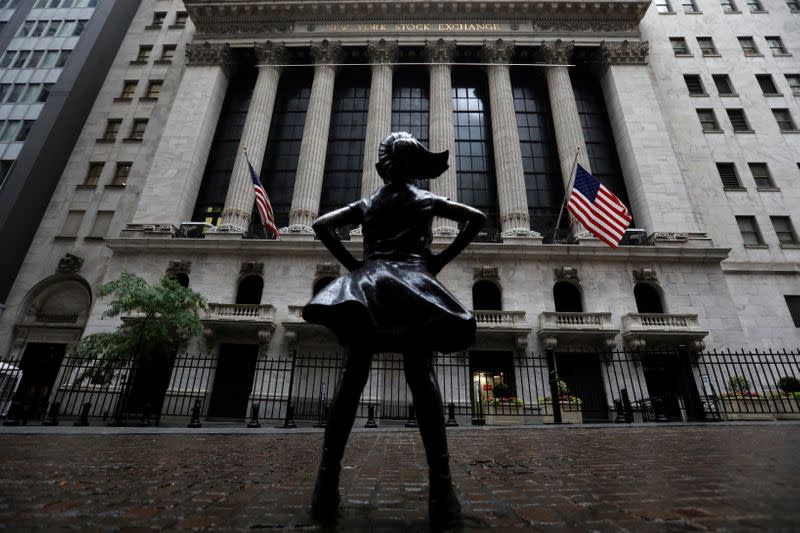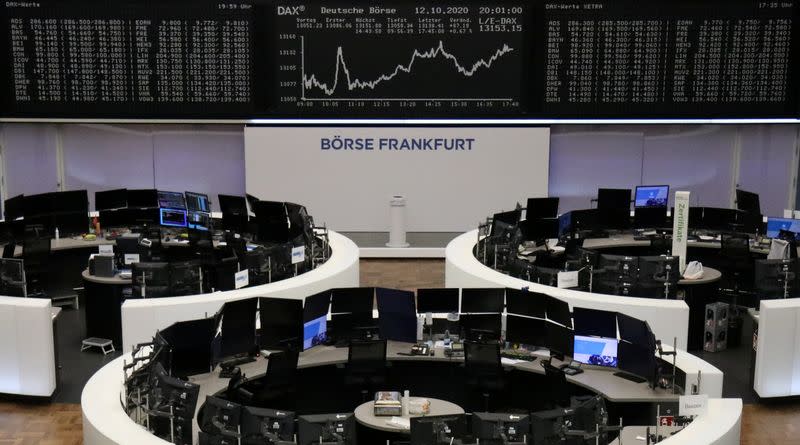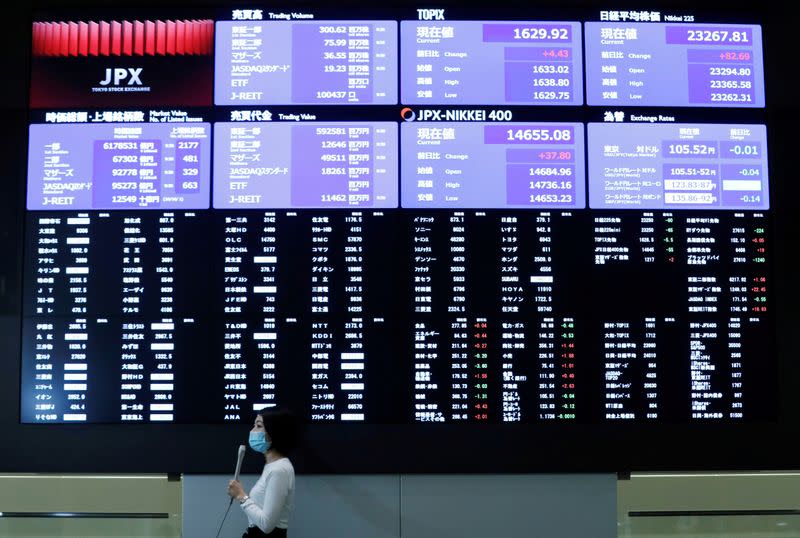World stocks sag on pandemic surge, gold gains on safety bid
By Koh Gui Qing
NEW YORK (Reuters) - Global stock markets mostly retreated on Wednesday as a record number of new coronavirus infections in parts of Europe led investors to shift away from risky assets to traditional safe havens such as gold and the Japanese yen.
Concerns that a resurgence in the COVID-19 pandemic could lead governments to again shut down economies spurred profit-taking, particularly after the recent stock rally.
Pandemic uncertainties were compounded by news on Tuesday of halts to separate trials for a COVID-19 vaccine and a treatment, tempering a brief stock boost from U.S. investment bank Goldman Sachs Group's <GS.N> strong earnings report.
Remarks by U.S. Treasury Secretary Steven Mnuchin that a deal for more fiscal stimulus would not likely be reached before the Nov. 3 elections also capped gains in shares.
Major U.S. stock indexes gave up early gains and the S&P 500 <.SPX> closed down 23 points, or 0.7%, at 3,488.67. The Dow Jones Industrial Average <.DJI> dropped 166 points, or 0.6%, to 28,514.00, while the Nasdaq Composite Index <.IXIC> shed 95 points, or 0.8%, at 11,768.73.
"The fear is we are headed back towards a lockdown, not a re-opening of economies," said Tim Ghriskey, chief investment strategist at Inverness Counsel in New York.
France declared a public health state of emergency on Wednesday, while Italy, Russia and Poland all reported their highest-ever daily tallies of new infections.
With COVID-19 cases surging, some European nations are closing schools, canceling surgeries and enlisting student medics as overwhelmed authorities braced for a repeat of the nightmare scenario seen earlier this year.
The pan-European STOXX 600 <.STOXX> ended barely changed at 370.62, while markets in Frankfurt <.GDAXI> and Paris <.FCHI> were flat and down 0.1%, respectively. London <.FTSE>, buffeted in part by Brexit angst, dropped 0.6%. World stocks <.MIWD00000PUS> slipped 0.3% but stayed within sight of the all-time high struck on Sept. 3.
Asian stocks were also lackluster. MSCI's broadest index of Asia-Pacific shares outside of Japan <.MIAPJ0000PUS> ended a seven-day rally and slipped 0.11%, a day after hitting a 2-1/2 year high of 588.76. Chinese shares <.CSI300> closed down 0.7%.
The price of gold <XAU=> climbed more than 1% before narrowing gains to $1,903.15 an ounce.
Government bonds also benefited from investor caution. German bund yields <DE10YT=RR>, which move inversely to prices, hit their lowest since May [EUR/GVD]. The 10-year U.S. Treasury yield <US10YT=RR> dipped to 0.7256%, and the yield curve - the gap between two- and 10-year yields - flattened a touch on news that more U.S. fiscal stimulus was unlikely before the Nov. 3 election. [US/]
The U.S. dollar softened after pulling its best day in three weeks on Tuesday. The dollar index <=USD>, which measures the greenback against a basket of six major currencies, fell 0.2% to 93.38.
In a sign that some investors preferred traditionally safer assets for now, the yen <JPY=> gained 0.4% to hit a near two-week high of 105.11 against the dollar.
The euro <EUR=EBS> was little changed at $1.1753 after hitting a nine-day low of $1.1718, while sterling <GBP=D3> held above $1.30, helped by news of "some progress" in British-European Union trade talks this week. By early evening, the pound was up 0.7% at $1.3031.
A weaker dollar, which makes oil cheaper for holders of other currencies, supported oil prices.
Brent crude <LCOc1> gained 92 cents, or 2.2%, to $43.37 a barrel, while U.S. West Texas Intermediate <CLc1> added 87 cents, or 2.2%, to $41.07.
(Reporting by Koh Gui Qing; Editing by Lisa Shumaker, Leslie Adler and Richard Chang)



